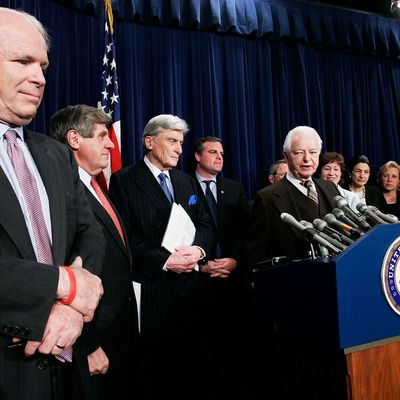
Nobody in either party in the Senate is willing to associate her or his name with the idea just yet. But it was inevitable the model set in 2005 by the bipartisan “Gang of 14” might be mentioned and at least considered in private as a way to pave the way for an easy confirmation of Neil Gorsuch’s while maintaining Democratic leverage over a possible second Trump SCOTUS nominee. It’s a potential “deal” that the Washington Post endorsed editorially last night:
[T]he parties could strike a deal that would preserve the filibuster for the minority party in the case of future nominees while providing for an up-or-down vote on Mr. Gorsuch’s confirmation. That, not deepening the politicization of the judiciary, is the best path forward.
The precedent is clear enough. The “Gang of 14” group of seven Democratic and seven Republican senators headed off a deployment of the so-called “nuclear option” — that is, nuking the filibuster — by Senate Republicans frustrated with Democratic foot-dragging on the Bush administration’s judicial nominees (not for SCOTUS, but for lower courts). The Democrats (enough to ensure a majority) agreed to open the spigots for confirmation of a select group of Bush nominees in exchange for Republican pledges not to vote for a rule change ending judicial filibusters. The deal worked initially; five Bush judges got through while two withdrew, and the nuclear option was holstered. The Gang of 14 also prevented a filibuster confrontation over one SCOTUS nominee, Samuel Alito, who was confirmed with just 58 votes, two short of what would have been required to kill a filibuster.
The deal became moot after the 2006 elections gave Democrats control of the Senate. And in 2013 Democrats did indeed trigger the nuclear option ending filibusters against executive and lower-court judicial nominations, though stopping short of applying the measure to SCOTUS nominations.
The idea now, as reported by Politico, is that a new “gang” would give Gorsuch enough Democratic support to clear the Senate without a filibuster, a cloture vote, or deployment of the nuclear option to enable his confirmation by a simple majority.
The deal Democrats would be most likely to pursue, the sources said, would be to allow confirmation of Gorsuch in exchange for a commitment from Republicans not to kill the filibuster for a subsequent vacancy during President Donald Trump’s term. The next high court opening could alter the balance of the court, and some Democrats privately argue that fight will be far more consequential than the current one.
Presumably you’d just need three GOP members to sign onto a deal to effectively prevent Republicans from going nuclear (at least so long as the composition of the Senate does not change). As it happens, there are three remaining Republicans (but no Democrats) from the original “gang”: Susan Collins, Lindsey Graham, and John McCain. But there’s been no indication yet that there are any other Republicans interested in getting the old gang back together. On the other side of the barricades you’d have to figure the same Senate Democrats most likely to be under intense pressure to vote for Gorsuch would love the opportunity to do so as part of a deal that gave their party something tangible.
For the same reason that such a deal might tempt Democrats, conservative advocacy groups are likely to hate it. Gorsuch’s confirmation, after all, will simply return the Court’s ideological balance to where it was before Antonin Scalia’s death. It’s the next appointment, if made by Trump to replace any of the oldest members of the Court (Ginsburg, 84; Kennedy, 80, and Breyer, 78), that could lead to the Great White Whale of conservative legal causes, the overturning of Roe v. Wade. The extensive ideological vetting operation that produced Gorsuch’s nomination as a reliable conservative will be loosey-goosey compared to what will happen if Trump gets a quick second vacancy to fill. And so the idea of giving up the nuclear option then in order to give Gorsuch an easy ride he really doesn’t need will be adamantly opposed by the right.
For that matter, it does not appear liberal advocates would go along with a new “gang” deal, either.
The move would be met by criticism on the left. Josh Orton, a longtime Democratic aide working against Gorsuch, said any attempt to confirm him would “hand Trump’s White House not only its first win, but one of the biggest victories any White House can get.”
“I literally can’t think of a more unstrategic move for a Democratic senator,” said Ilyse Hogue, President of NARAL Pro-Choice America.
If NARAL, the most obvious beneficiary of a deal that could make the appointment of a hard-core fifth vote on SCOTUS to reverse Roe immensely more difficult, thinks it’s a nonstarter, it’s hard to imagine where support for it would come from.
And so the more likely outcomes are either a filibuster against Gorsuch that leads immediately to the nuclear option, or approval by 60 or more votes that maintains the nuclear option for a potential fight over future Trump SCOTUS nominee Attila T. Hun. Get ready for the fallout.






























